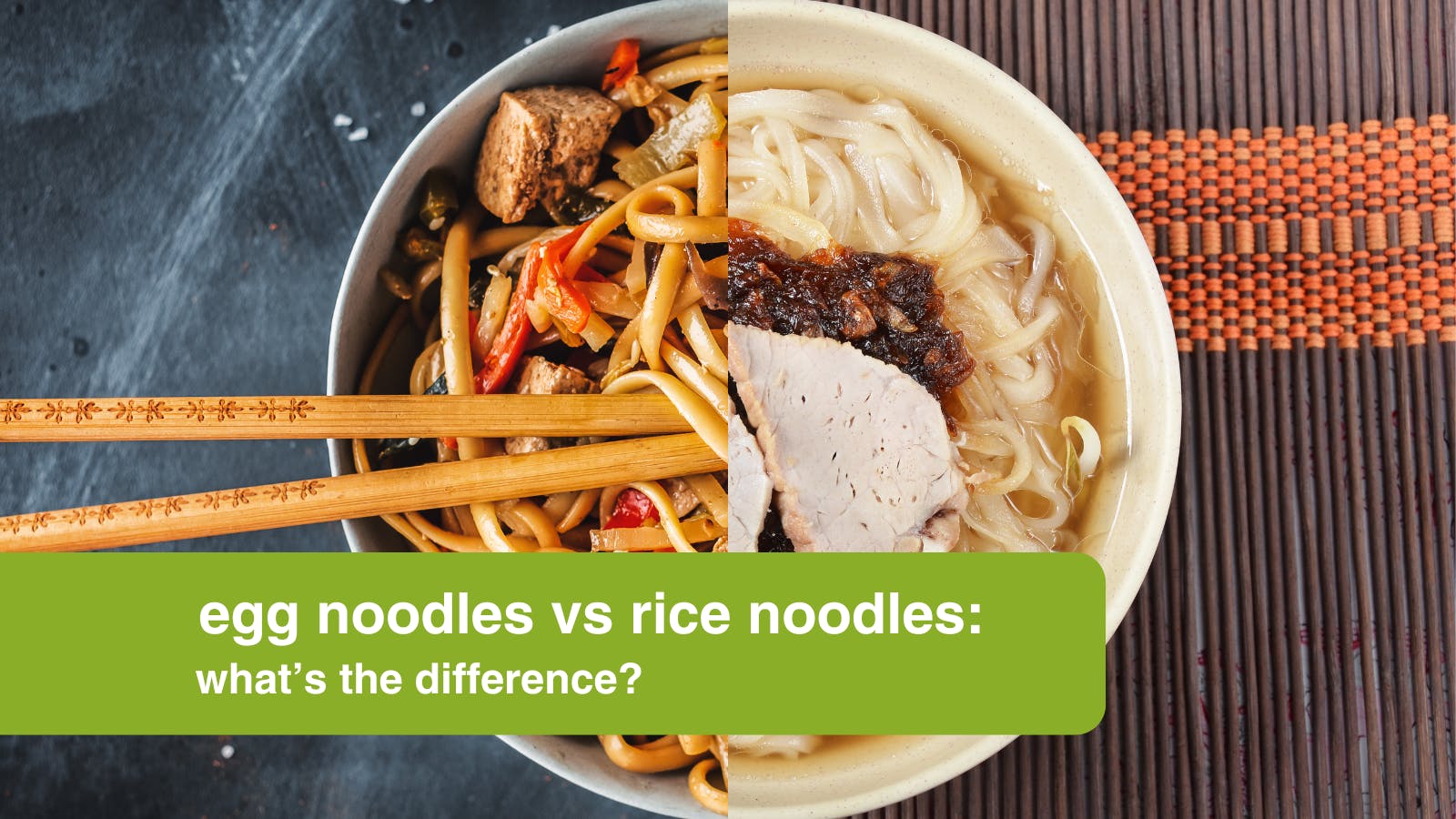your cart
Your cart is empty.
Recipes
General Articles
Egg Noodles Vs Rice Noodles: What's the Difference?
From ingredients and flavour to cooking time and calories, there are a few key differences when it comes to egg noodles and rice noodles.

There are several different types of noodles commonly used in cooking. Two of the most popular types are egg and rice noodles. While they can seem similar at first glance, they each offer unique benefits that make them better suited for different cooking styles and dishes.
Discover their key differences and which may be better for your dish.
What are Egg Noodles?
Egg noodles, made with egg and wheat flour, are used in a wide variety of cuisines from around the world. They have a distinctive golden yellow colour thanks to the egg content and a slightly savoury, rich flavour.

What are Rice Noodles?
Primarily made from rice flour and water, rice noodles have a delicate, chewy texture. They are a staple in various Asian cuisines, particularly Southeast Asian countries such as Thailand and Vietnam. You can get various types of rice noodles, including things like vermicell and rice sticks.

The Differences Between Egg & Rice Noodles
Let’s break down the key differences a bit further.
Ingredients
The most obvious difference between egg noodles and rice noodles is the main ingredient of each. Egg noodles are usually made from eggs and wheat flour. Rice noodles are made using rice flour and water.
Gluten Content
As such, egg noodles are not suitable for those who are coeliac or gluten intolerant, as they contain wheat flour. Rice noodles are typically naturally gluten-free.
Vegan Friendly
Egg noodles are also not vegan, as they contain eggs. Rice noodles, on the other hand, are generally suitable for vegans.
Texture
Egg noodles and rice noodles also differ in terms of texture and consistency. Once cooked, egg noodles tend to be soft and tender, with a slightly dense, chewy texture.
Rice noodles are much thinner than egg noodles, offering a more delicate yet still chewy texture. As such, you have to be careful when cooking rice noodles, as overcooking them can turn them mushy.
Cooking Time
When cooking your noodles, the time it takes to cook will depend on the type of noodles you are using. The specific cooking instructions will vary depending on the brand of noodle you have purchased, but as a general example, egg noodles should be simmered in boiling water for 4-5 minutes before being stir-fried or added to your dish. Egg noodles will have a golden yellow colour when cooked.
Conversely, rice noodles generally don’t need to be simmered; instead, they should be placed in a bowl of boiling water and left to soak for 3 minutes. Rice noodles are transparent before cooking, and become white once cooked.

Taste
Egg noodles and rice noodles have different tastes, meaning that the type of noodle you choose for your dish can have an impact on its flavour.
Egg noodles have a slightly salty and savoury flavour, while rice noodles are more neutral in flavour.
Therefore, rice noodles are a good choice for dishes where you want the flavours of the other ingredients to stand out, while egg noodles are better suited for dishes where you want the noodles to contribute to the overall flavour of the dish.
Dishes
Egg noodles are a versatile ingredient and are commonly used in dishes like lo mein, chow mein and other Chinese-inspired stir fries.
Rice noodles are common in Thai and Vietnamese dishes and are used for things like pad Thai, pho, and noodle salad.

Nutrition & Calories
Both egg noodles and rice noodles are relatively low in calories and fat, and they are both good sources of carbohydrates and energy.
An average portion of medium egg noodles contains 206 calories and 1.2g of fat. An average portion of rice noodles contains 162 calories and 0g of fat.
Egg noodles do contain a slightly higher amount of protein than rice noodles, which makes them a good choice for people looking to increase their protein intake.
Rice noodles, on the other hand, are generally lower in calories and have a lower glycemic index, which means they are absorbed by the body more slowly, making them a better choice for people with diabetes or blood sugar concerns.
Ultimately, both egg and rice noodles are brilliant staples for a range of authentic Asian-inspired dishes. Browse our full selection of Asian noodles to make some delicious culinary creations at home.
this site uses cookies
We and our advertising partners use cookies on this site and around the web to improve your website experience and provide you with personalised advertising from this site and other advertisers. By clicking allow, you accept the placement and use of these cookies for these purposes. Learn More




